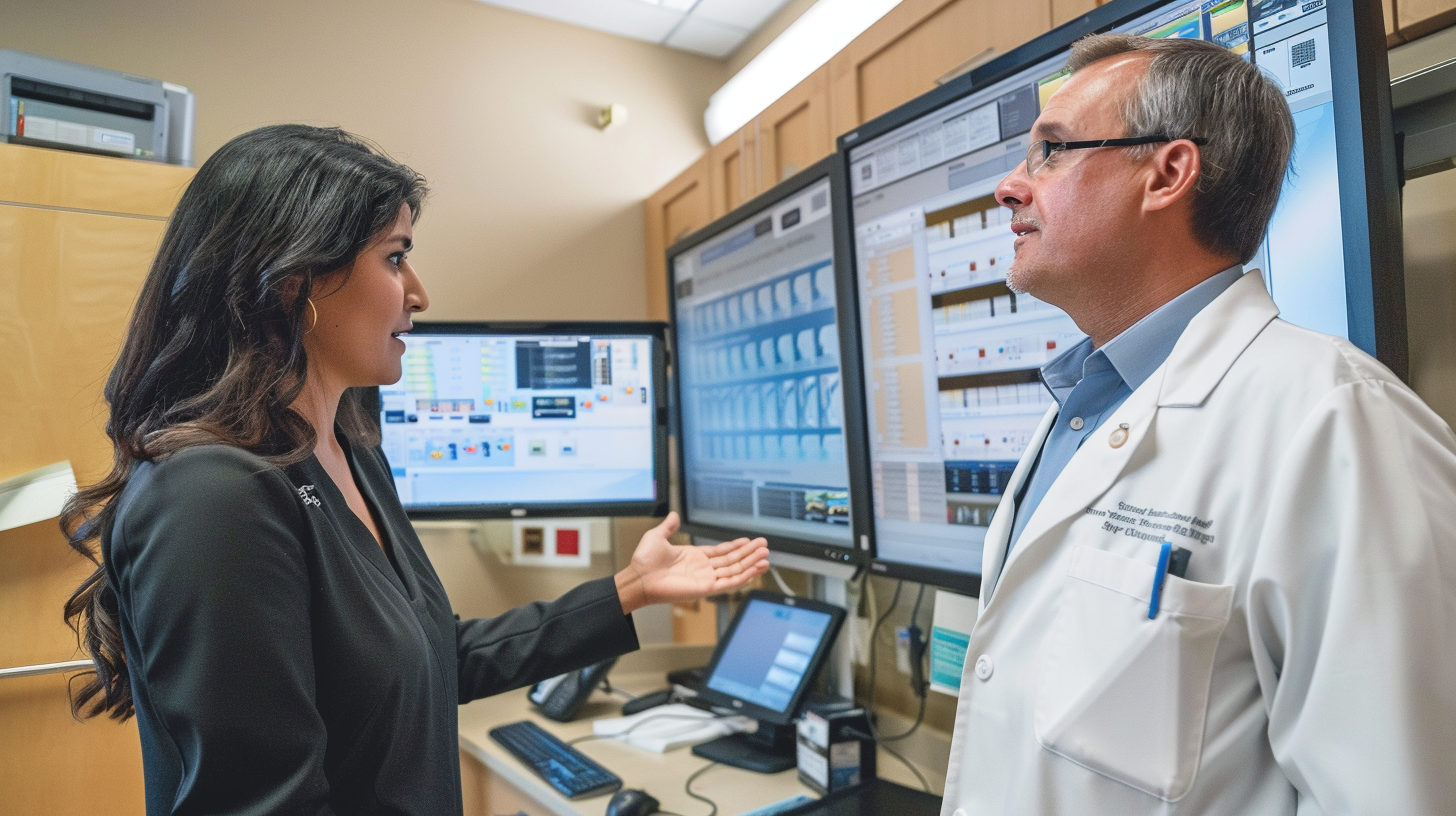In the fast-paced world of healthcare, radiology information systems (RIS) play a crucial role in streamlining operations and improving patient care. However, out-of-the-box RIS solutions may not always meet the specific needs of a healthcare facility. To address this, many organizations turn to developing custom modules for their RIS, which allow them to extend the functionality of the system to better align with their unique requirements. In this article, we will explore the benefits, considerations, common modules, best practices, and challenges associated with developing custom modules for RIS.
Overview of Custom Modules in RIS
Custom modules are additional features or functionalities that are designed specifically for a particular RIS system. These modules can be developed by in-house teams or by third-party vendors, and are integrated into the existing RIS infrastructure to enhance its capabilities.
By extending the functionality of RIS, custom modules provide healthcare organizations with the flexibility to tailor the system to their specific workflows, processes, and reporting requirements. Whether it's automating certain tasks, creating specialized reports, integrating with other systems, or customizing the user interface, custom modules offer a wide range of possibilities.
One key advantage of custom modules is their ability to address unique needs that may not be met by off-the-shelf RIS solutions. For example, a radiology department that specializes in a particular type of imaging procedure may require a custom module to capture and analyze specific data points that are not included in standard RIS templates. This level of customization can significantly improve efficiency and accuracy in reporting, ultimately leading to better patient care.
Furthermore, custom modules can also play a crucial role in ensuring compliance with regulatory requirements and industry standards. For instance, a custom module designed to automate the generation of audit trails for patient data access can help healthcare providers demonstrate adherence to data privacy regulations such as HIPAA. This not only streamlines compliance efforts but also enhances data security and patient confidentiality.
Benefits of Extending RIS Functionality
Developing custom modules for RIS offers numerous benefits to healthcare facilities. First and foremost, it enables organizations to optimize their workflows and automate repetitive tasks, leading to increased efficiency and productivity. Custom modules can streamline processes such as scheduling, image management, report generation, and billing, saving valuable time for radiologists and administrators.
Furthermore, custom modules allow for enhanced data analysis and reporting capabilities. Healthcare organizations can develop modules that provide advanced data visualization, business intelligence, and analytics tools, enabling them to gain valuable insights from their imaging data. This can contribute to improved decision-making, operational efficiency, and patient outcomes.
Another key benefit of extending RIS functionality is the ability to integrate the system with other healthcare IT solutions. Custom modules can facilitate seamless integration with electronic health records (EHR), picture archiving and communication systems (PACS), and other radiology modalities, promoting a unified and interoperable healthcare ecosystem.
Moreover, by extending RIS functionality through custom modules, healthcare facilities can enhance patient engagement and satisfaction. These modules can be designed to provide patients with access to their imaging reports, appointment scheduling, and educational resources, empowering them to take an active role in their healthcare journey. This increased transparency and convenience can lead to higher patient compliance and improved overall outcomes.
Additionally, custom modules offer the flexibility to adapt to evolving regulatory requirements and industry standards. Healthcare organizations can develop modules that ensure compliance with data security regulations, interoperability standards, and quality reporting mandates. This proactive approach not only helps facilities avoid costly penalties but also positions them as leaders in delivering high-quality, patient-centered care.
Key Considerations for Developing Custom RIS Modules
Developing custom RIS modules requires careful planning and consideration. It is important to assess the specific needs of the healthcare organization and prioritize the functionalities that will bring the most value. Conducting a thorough analysis of workflows, user requirements, and existing system capabilities is essential to ensure a successful implementation.
Furthermore, organizations should carefully select the development approach for their custom modules. In-house development provides greater control and flexibility, but it requires expertise in software development and may be more time-consuming. Engaging with third-party vendors can expedite the development process, but requires thorough evaluation of vendor capabilities, reliability, and support.
Security and data privacy must also be prioritized when developing custom RIS modules. Patient information and imaging data are highly sensitive, and healthcare organizations must ensure that all security measures are in place to protect this data. Compliance with relevant regulations, such as HIPAA, is paramount throughout the development and implementation process.
Moreover, it is crucial for organizations to consider scalability when developing custom RIS modules. As healthcare organizations grow and evolve, the custom modules should be able to adapt and scale accordingly. This requires a forward-thinking approach during the initial development phase to anticipate future needs and ensure that the modules can accommodate increased data volume and user load.
Collaboration with key stakeholders, including clinicians, IT staff, and administrators, is essential throughout the development process. By involving end-users from the early stages of development, organizations can gather valuable feedback, ensure alignment with user needs, and increase user adoption rates. This collaborative approach can lead to the creation of custom RIS modules that truly meet the needs of the healthcare organization and its staff.
Common Custom Modules and Their Applications
Custom modules for RIS can be tailored to address a wide range of specific requirements. Some common modules include:
- Advanced Reporting: Developing custom reporting templates and workflows to generate specialized reports based on radiologists' preferences and requirements.
- Automated Workflow: Implementing modules that automate various steps in the radiology workflow, such as appointment scheduling, image acquisition, and report distribution.
- Integration with PACS and EHR: Custom modules can facilitate seamless integration with PACS and EHR systems to ensure smooth data exchange and interoperability.
- Business Intelligence and Analytics: Developing modules that provide comprehensive data analysis, visualization, and performance metrics to support decision-making and optimize operations.
Moreover, custom modules can also be designed to enhance radiology department efficiency and patient care. For instance, a specialized module could be created to streamline the process of handling emergency cases, ensuring prompt prioritization and reporting for critical situations. This module could integrate with existing systems to alert radiologists of urgent cases, optimize image processing for rapid diagnosis, and facilitate swift communication of results to healthcare providers.
Additionally, custom modules can extend beyond traditional radiology functions to support research initiatives and academic endeavors. Researchers may benefit from a module that enables advanced data mining and trend analysis within radiology databases, aiding in the identification of patterns, outcomes, and research opportunities. This module could offer sophisticated algorithms for pattern recognition, statistical analysis tools, and visualization capabilities to assist researchers in extracting valuable insights from large volumes of imaging data.
Best Practices for Implementing Custom RIS Modules
Implementing custom RIS modules successfully requires adherence to best practices and careful execution. The following guidelines can increase the likelihood of a smooth and effective implementation:
Custom RIS modules play a crucial role in enhancing the functionality and efficiency of radiology information systems. By tailoring these modules to specific requirements and workflows, healthcare facilities can optimize their operations and improve patient care outcomes. To ensure a successful implementation, it is essential to follow best practices that encompass thorough planning, collaboration, agile development, testing, and user support.
- Thorough Planning: Conduct a detailed assessment of requirements, workflows, and system capabilities to ensure alignment and prioritize objectives.
- Cross-functional Collaboration: Involve stakeholders from various departments, including radiologists, IT staff, administrators, and end-users, to gather insights and ensure buy-in throughout the process.
- Agile Development: Adopt an iterative approach to development, focusing on delivering incremental value and incorporating feedback along the way.
- Testing and Quality Assurance: Rigorous testing of custom modules is crucial to identify and address any bugs or issues before deployment.
- User Training and Support: Provide comprehensive training to end-users and establish a robust support system to address any issues that may arise post-implementation.
Furthermore, when planning for custom RIS modules, it is important to consider scalability and future-proofing. Anticipating future needs and potential system expansions can help in designing modules that can adapt and grow along with the organization. By building flexibility into the modules, healthcare providers can avoid costly redevelopments and minimize disruptions to daily operations.
Challenges and Solutions in Developing Custom RIS Modules
Developing custom RIS modules can present some challenges. One common challenge is the balancing act between customization and maintainability. It is important to strike the right balance to avoid complex and hard-to-maintain solutions. Proper documentation and modular design can help mitigate these challenges.
Another challenge is ensuring compatibility and seamless integration with existing RIS infrastructure and other healthcare IT systems. Thorough testing, adherence to interoperability standards, and collaboration with vendors can help overcome this challenge.
Lastly, resource allocation and budgeting pose challenges during custom module development. Organizations should allocate appropriate resources and establish a realistic budget to ensure smooth progress and successful implementation.
When it comes to balancing customization and maintainability, it is crucial to involve stakeholders from various departments to gather requirements effectively. Understanding the needs of end-users, administrators, and IT support teams can lead to a more streamlined and sustainable custom RIS module. Additionally, conducting regular code reviews and implementing coding best practices can enhance maintainability without sacrificing customization.
Ensuring compatibility with existing RIS infrastructure involves not only technical considerations but also organizational alignment. It is essential to have open communication channels between IT teams, healthcare providers, and system users to address any compatibility issues proactively. Moreover, staying informed about industry trends and emerging technologies can help future-proof custom RIS modules and facilitate smoother integration with evolving healthcare IT ecosystems.
Enhancing RIS for Improved Imaging Center Operations
Custom modules have the potential to revolutionize imaging center operations by extending the functionality of RIS. By developing modules that align with specific requirements, healthcare organizations can streamline workflows, improve efficiency, and enhance patient care. With careful planning, cross-functional collaboration, and adherence to best practices, organizations can leverage custom modules to unlock the full potential of their RIS systems and drive innovation in radiology.
One key aspect to consider when implementing custom modules is the impact on data security and compliance. As healthcare organizations handle sensitive patient information, it is crucial to ensure that any custom modules meet stringent security standards and comply with regulations such as HIPAA. By conducting thorough security assessments and implementing robust data encryption measures, organizations can safeguard patient data while benefiting from the enhanced capabilities of custom modules.
Furthermore, the scalability of custom modules plays a vital role in long-term operational efficiency. As imaging centers grow and evolve, the ability to scale custom modules to accommodate increasing data volumes and user demands becomes essential. By designing modular and scalable custom solutions, organizations can future-proof their RIS systems and adapt to changing operational needs without significant disruptions or costly redevelopments.
Ready to take your imaging center's efficiency to the next level? AbbaDox is here to help you unify and optimize your radiology workflows with our cloud-based automation platform. Embrace the power of a single, scalable, and user-friendly solution that's been enhancing radiology practices since 2003. Don't miss the opportunity to transform your RIS with custom modules that cater to your unique needs. Meet with a product consultant today and discover how AbbaDox can revolutionize your operations.

-1.png)







